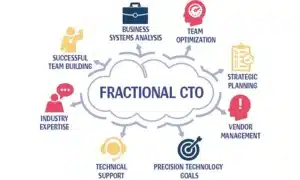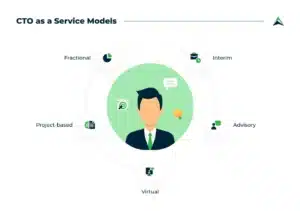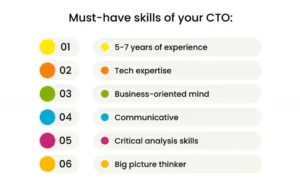Startups have always been characterized by agility, innovation, and the promise of transforming ideas into reality. This is especially true for tech startups that rely heavily on technology to innovate and stay ahead of the curve.
Every year, numerous startups attempt to bring revolutionary ideas to the market. However, only some startups are destined for success. Statistics show that up to 90% of startups fail every year. One major pitfall is equity distribution; many startups that achieve Unicorn status often regret giving out equity too freely in the early stages.
While tech is essential, only some founders have a tech background. Someone who can provide strategic thinking and seasoned technological expertise must fill this tech gap. In most cases, startups look for a CTO or a technical co-founder. However, recruiting the right tech leadership poses several challenges.
Unraveling the Concept: What is a Fractional CTO?
Simply put, a fractional CTO, also known as a fractional chief technology officer, is a seasoned tech strategist offering the same expertise as a conventional, full-time CTO without the corresponding full-time overhead. The core responsibilities of a fractional CTO encompass designing tech strategies, aligning them with business goals, assessing and mitigating tech-related risks, and fostering innovation.
What sets fractional CTOs apart is their adaptability. As a company’s needs shift and evolve, so does the involvement of the fractional CTO. This elasticity is particularly advantageous for startups and SMEs, which may still need to have the means to manage the intricate challenges of rapid tech growth and change. In such environments, a fractional CTO seamlessly bridges the strategic leadership gap.
Why Embrace a Fractional CTO?
A Budget-Friendly Approach:
Having a fractional CTO eliminates the need for a substantial full-time salary. Instead, businesses get the expertise they require for only a portion of the time—and cost.
A Wealth of Knowledge:
Typically, fractional CTOs have vast experience across a spectrum of industries and technologies, placing them in an excellent position to offer strategic advice that propels businesses forward.
Adaptability:
Fractional CTOs, often engaged in CTO consulting, are synonymous with flexibility. Companies can hire them for specific tasks, projects, or challenges, ensuring agile adaptation to dynamic market shifts.
Empowering the Team:
By mentoring and augmenting the skills of the existing tech team, fractional CTOs lay the foundation for a more robust internal squad, poised to handle future tech challenges efficiently.
The Ideal Beneficiaries of Fractional CTO Services
Startups & SMEs:
With limited resources but boundless aspirations, startups and SMEs can use fractional CTO services to garner tech leadership and insights, positioning them for growth and competitive leverage.
Companies Navigating Change:
Whether it’s mergers, acquisitions, or scaling, businesses in transition can immensely benefit from the steady hand of a fractional CTO, ensuring smooth tech integrations and operations.
Task-Specific Engagements:
For organizations embarking on particular tech projects, a fractional CTO offers the requisite expertise to guide the project from inception to completion.
Non-Tech Firms:
Businesses outside the tech arena, yet keen on tech integration to improve operations, can turn to a fractional CTO for informed guidance through the integration process.
Companies Navigating Change:
Whether it’s mergers, acquisitions, or scaling, businesses in transition or those looking into CTO outsourcing can immensely benefit from the steady hand of a fractional CTO, ensuring smooth tech integrations and operations.
Globally Distributed Entities:
In an age of remote work and global teams, a fractional CTO familiar with remote operations ensures consistent tech leadership across varied locales.
Recognizing Potential Challenges
Like all things, engaging a fractional CTO is not devoid of challenges:
Divided Attention:
Balancing multiple clients sometimes limits the fractional CTO’s availability, making it tricky for firms that require intensive CTO engagement.
Limited Organizational Familiarity:
Given their part-time nature, a fractional CTO might need to grasp the company culture or vision fully, affecting strategy alignment and team dynamics.
Communication Barriers:
Communication can be challenging for those operating remotely or in different time zones, emphasizing the need for structured communication strategies.
Confidentiality Concerns:
Handling data for multiple clients necessitates robust measures to protect proprietary information.
However, these challenges can be mitigated with clear communication, setting expectations, and ensuring alignment from the outset.
Why Should You Hire a Fractional CTO?
- Cost-Efficiency: Hiring a full-time CTO can be expensive, with Glassdoor citing average CTO salaries of $173,968/year, which can exceed $300,000/year depending on various factors. Fractional CTOs, being part-time, can provide startups with significant cost savings.
- Less Equity at Stake: A full-time CTO might demand 10%-40% equity in your startup. In contrast, a fractional CTO might perform the same duties for just 1%-2% equity.
- Diverse Exposure: Since fractional CTOs often work with multiple companies, they bring diverse experiences. This broad exposure can be invaluable for startups, offering fresh perspectives and strategies.
- Expert Guidance: For non-tech founders, navigating the world of technology can be daunting. From selecting the right development agencies to ensuring the final product is technically sound, a fractional CTO provides the expertise required.
5 Scenarios When to Avoid a Fractional CTO
While fractional CTOs can be a boon for many startups, offering technical expertise without the heavy price tag or equity commitment isn’t a one-size-fits-all solution. There are specific scenarios in which a full-time CTO might be a more suitable fit. Understanding these contexts is crucial for startups looking to make the best decisions for their technological leadership.
Here are five situations where you might want to reconsider hiring a fractional CTO:
Managing a Large Tech Team
Full-time CTOs are generally better equipped to handle the demands of a large tech team. Their full-time commitment ensures they can provide hands-on management, address immediate challenges, and lead a substantial team effectively. This immersive engagement is vital for maintaining smooth operations in a more extensive setup.
Operating in Highly Regulated Industries
Specific sectors, like healthcare, finance, and government, have many regulations and stringent compliance requirements. In these industries, continuous oversight and in-depth expertise are essential. A full-time CTO, deeply familiar with the nuances of such regulations, can offer the needed guidance and vigilance.
Dealing with Complex, Proprietary Technologies
If your business operates within a highly specialized tech niche or you’re leveraging proprietary technologies, it’s crucial to have consistent and dedicated technical leadership. A full-time CTO can provide the uninterrupted focus and deep understanding required for these areas.
Facing Crisis Management
Dedicated and continuous leadership becomes indispensable in significant technological crises or high-risk scenarios. With their undivided attention, a full-time CTO can manage and resolve pressing issues more effectively than someone juggling multiple commitments.
Planning Long-Term Strategic Development
A full-time CTO’s continuous presence and embedded understanding can be invaluable for startups aiming at long-term strategic growth and development. Such a CTO, deeply ingrained in the company culture and familiar with its intricacies, can offer insights and strategies aligned with the startup’s long-term vision.
Challenges Addressed by Fractional CTOs
A fractional CTO isn’t merely a substitute for a full-time CTO; they’re strategic catalysts well-versed in critical decision-making frameworks, such as the Playing to Win strategy of Roger L. Martin and insights from Michael Porter’s seminal work, Competitive Strategy.
Let’s explore the diverse array of challenges they can adeptly navigate:
- Deciding on Rewrite vs Refactor: With the evolution of technology, there’s often a tug of war between overhauling a product entirely or refining the existing one. An external, unbiased viewpoint of a fractional CTO can illuminate the right direction, ensuring team alignment.
- Choosing between Build, Buy, or Partner: As tech dynamics shift, the roadmap to progression may blur. Making the strategic choice between developing in-house, purchasing solutions, or forming alliances is where the expertise of a fractional CTO shines.
- Navigating Roadmap Dilemmas: Setting priorities and aligning visions can be challenging when product and tech teams see things differently. A fractional CTO serves as a mediator, providing clarity and direction.
- Guidance in Fundraising: If capital infusion is on the horizon, a fractional CTO’s insights into the company’s strengths and vulnerabilities and presenting them to prospective investors can be invaluable.
- Optimizing Contract Deals: Ensuring you’re getting the most out of your technical partnerships requires adept negotiation skills. An external fractional CTO can provide an unbiased perspective, ensuring value for both parties.
- Navigating the Maze of GDPR: With the increasing significance of privacy, understanding and meeting GDPR obligations can be daunting. Fractional CTO clarifies data-related concerns, ensuring compliance without compromising functionality.
- Streamlining Open Source Integration: Leveraging open source requires adherence to licensing norms. A fractional CTO can guide the process if you consider open-sourcing your tech or integrating existing solutions, ensuring you sidestep common pitfalls.
Read more:-Cloud Technology for Startups: A Complete Guide
Final Words
In wrapping up, it’s evident that a fractional CTO’s role is integral in steering startups toward success in the competitive tech landscape. They address vital challenges, offering a cost-effective and adaptable solution for startups in various growth phases. As platforms like advansappz continue to champion the merits of a fractional CTO, startups must recognize the pivotal role such a position can play in sculpting their technological trajectory and overall vision. The path to innovation and scalability becomes more transparent and attainable with the right strategic partnership.
Frequently Asked Questions
A Fractional CTO provides strategic technology guidance, oversees product development, and implements scalable tech solutions, optimizing a startup’s technical infrastructure.
Unlike a full-time CTO, a Fractional CTO offers part-time, flexible services tailored to a startup’s needs, allowing cost-effective access to high-level technical expertise.
Hiring a Fractional CTO grants startups access to seasoned technical leadership, strategic planning, and implementation expertise without the commitment of a full-time executive.
A Fractional CTO can align technological strategies with business goals, streamline development processes, and introduce innovative solutions, fostering sustainable growth and scalability.















